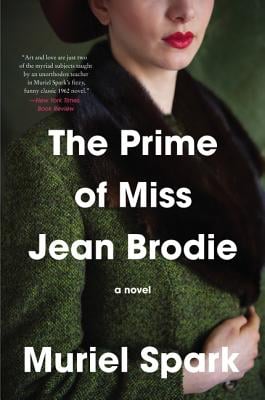APS TOGETHER
The Prime of Miss Jean Brodie by Muriel Spark

Hosted by Sarah Shun-lien Bynum
Began on September 30, 2020
Share this book club
The Prime of Miss Jean Brodie invites us into a world that feels heartbreakingly distant right now: a school classroom, filled with young minds and restless bodies and desks and noise and essays on how you spent your summer vacation. At the helm of our classroom is the indelible Miss Brodie, a character of magnificent convictions and questionable judgment who exercises outsized influence on her coterie of handpicked students, with unpredictable results. In this time of pervasive brain fog, I can’t imagine a more bracing antidote than the nimble storytelling and brilliant, funny, incisive sentences of Muriel Spark.


Muriel Spark
(1918–2006) was a Scottish novelist, short story writer, poet, and essayist. In World War II, she worked for Great Britain's Foreign Office, writing propaganda, and she later became the editor of the Poetry Review (1947–49). Her many books include The Comforters, Memento Mori, and The Prime of Miss Jean Brodie.

Daily Reading
Day 1
Ch. 1, pp. 1-11
October 1, 2020 by Sarah Shun-lien Bynum
I read The Prime of Miss Jean Brodie when I was 23, before starting my first job as a seventh-grade teacher. The fact that I turned to fiction as a handbook reveals just how ill-equipped I was. I hoped to learn from exemplary models: Goodbye Mr. Chips, To Sir With Love, etc.
Day 2
Ch. 2, pp, 13-26 (through “'That is the order of the great subjects of life, that’s their order of importance.'”)
October 2, 2020 by Sarah Shun-lien Bynum
Chap 2 begins with the girl whose death was just introduced so suddenly: hapless and lumpy Mary Macgregor. Spark remains unsparing (even as an adult Mary “was clumsy and incompetent”) yet she also creates an understated sense of pathos with this character.
Day 3
Finish Ch. 2, pp. 26-41
October 3, 2020 by Sarah Shun-lien Bynum
Another bold flash-forward, starring Eunice the gymnast: we leap ahead to 1949, when the Edinburgh Festival was still new. It was founded in 1947 to provide “a platform for the flowering of the human spirit” in the aftermath of WW2. Miss B would approve.
Day 4
Ch. 3, pp. 43-55 (through “photographing this new Miss Brodie with her little eyes.”)
October 4, 2020 by Sarah Shun-lien Bynum
Chapter 3 begins: "The days passed and the wind blew from the Forth.” The omniscient narrator is clearing her throat—wryly invoking the forces of time and weather—as a prelude to the sweeping commentary on history and society she’s about to entertain us with.
Day 5
Ch. 3, pp. 55-70 (through “with her little pig-like eyes”)
October 5, 2020 by Sarah Shun-lien Bynum
Spark in The New Yorker, 5/93: “Well, suspense isn’t just holding it back from the reader. Suspense is created even more by telling people what’s going to happen. Because they want to know how. Wanting to know what happened is not so strong as wanting to know how.”
Day 6
Finish Ch. 3, pp. 70-78
October 6, 2020 by Sarah Shun-lien Bynum
The transfiguring power of the incongruous adverb: “Jenny, out walking alone, was accosted by a man joyfully exposing himself beside the Water of Leith.” Even on the subject of flashers, we can expect Spark to say the unexpected
Day 7
Ch. 4, pp. 79-82 (through ““only the squares on the other two sides”)
October 7, 2020 by Sarah Shun-lien Bynum
James Wood observes, “In the course of the novel we never leave the school to go home, alone, with Miss Brodie. We surmise that there is something unfulfilled and even desperate about her, but the novelist refuses us access to her interior. This comment surprises me a little because Spark establishes so clearly the nature of her portrait. I would no more expect to go home with Miss Brodie than to overhear the inner thoughts of Jay Gatsby. To me the very title betokens myth, not interiority.
Day 8
Finish Ch. 4, pp. 92-104
October 8, 2020 by Sarah Shun-lien Bynum
Blood tells: Miss B divests this phrase of any pejorative sense, proudly claiming her wild ancestor. “He died cheerfully on a gibbet of his own devising” recalls being hoist with one’s own petard. Either gruesome end could describe Miss B’s downfall.
Day 9
Ch. 5, pp. 105-121
October 9, 2020 by Sarah Shun-lien Bynum
Dierdre Lloyd, alt-version of Scottish womanhood: peasant clothes, languid & long-armed, unbothered & informal. Miss B, Miss Lockhart, Dierdre: studying non-parental adults is such a big part of growing up, a key to figuring out who & how you want to be.
Day 10
Ch. 6, pp. 123-137 (The End)
October 10, 2020 by Sarah Shun-lien Bynum
The economy of her method: at the end of Chap 5, physical details like the bicycle boys and the tram-car stop tell us that we’ve completed the temporal lap and arrived back at the novel’s opening scene. An elegant way to re-introduce Joyce Emily in Chap 6